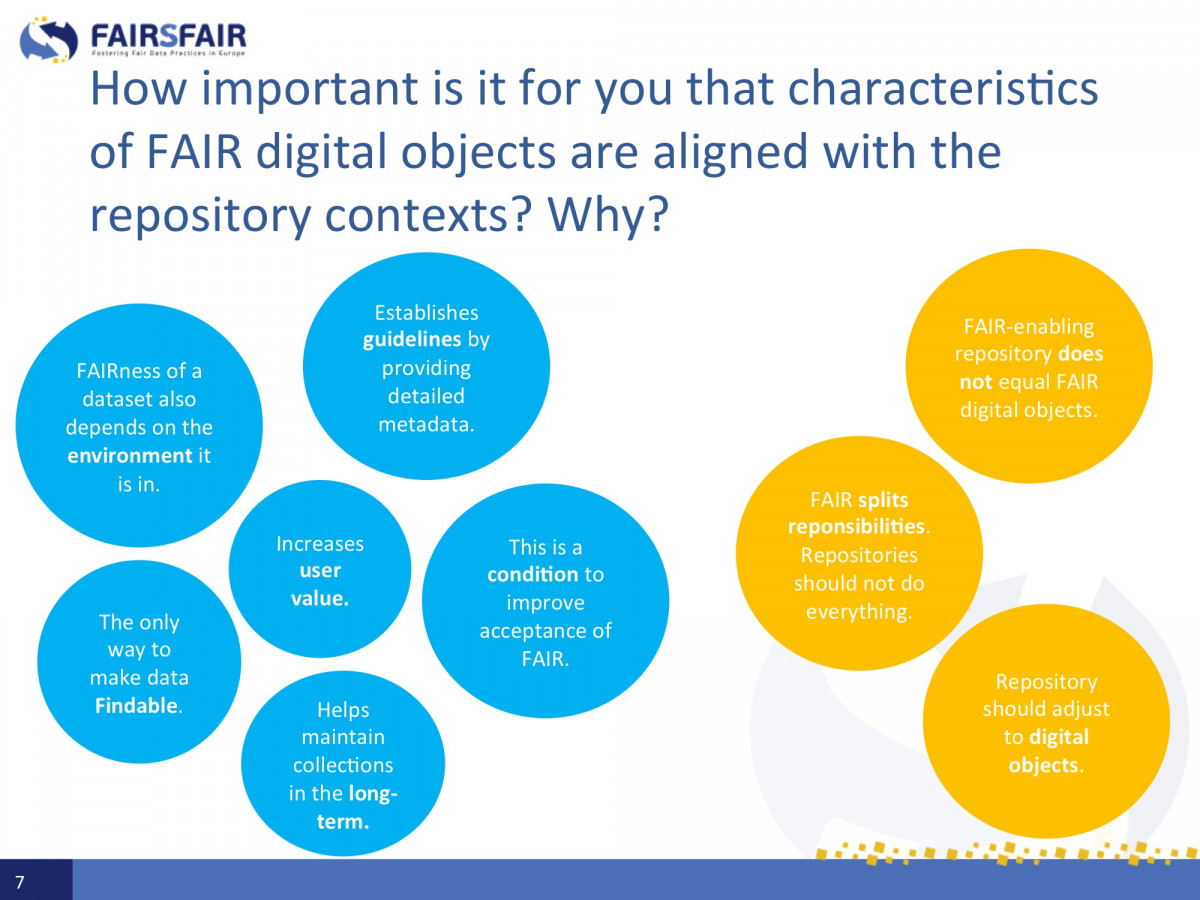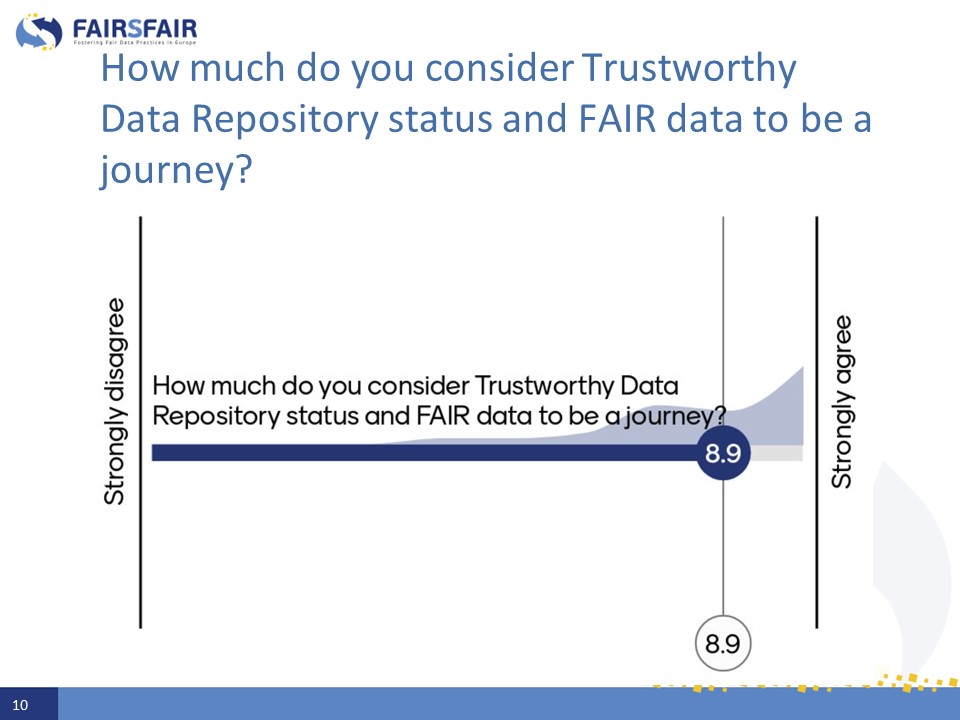FAIRsFAIR took advantage of their presence at EOSC-hub Week 2020, surveying 66 currently active service providers, repository managers, data services managers, and users to discover their thoughts and opinions about the FAIR certification of repositories and other data services. Article authored by Linas Cepinskas of FAIRsFAIR partner organisation DANS.
The Survey Group. The majority of those surveyed (20) were service providers such as data repositories, PID services, (federated) dataspaces, and data stewards. The next biggest group were the data repository managers (16) followed by data services managers and users (7). It’s important to note that some participants considered themselves both service providers and users, making the distinction between the two not always clear.
The 3 types of data services that users consider essential to enable FAIR data. Most respondents consider trustworthy data repositories, persistent identifiers, and rich metadata as most essential in making data FAIR. At the same time, tools, policies, data management planning and ontologies services are seen as very important too.
The importance of a formal certification process for FAIR enabling services. In general, the majority of respondents agreed about the importance of formal certification for FAIR-enabling services. They also indicated that good practices and recommendations (standards) are essential. Self-assessment was seen as helpful to learning and adjustment while certification was seen to provide a common standard of evaluation which would be unavailable otherwise. As far as the benefits of formal certification are concerned, the respondents considered third party assessments to be more objective. They also recognised the added value formal assessment brings to building and sharing community roadmaps, with FAIRness providing a balance between community practices in Open Science and the strategies of policy makers. Importantly, formal assessments were also seen to ensure a common standard of evaluation.
Regarding drawbacks to formal certification, respondents saw the process as time-consuming, difficult, and a potential limitation to practical data sharing. They also indicated that best practices and tools could offer an alternative to certification as these are usually more community-driven and tested. Furthermore, it was noted that a one-size-fits-all approach may not always be appropriate for repositories or services requiring different adjustments and guidance.
Overall it was felt that formal assessments should be informed by community practices and seek to provide researchers with appropriate standards and guidance.
The importance of aligning the characteristics of FAIR digital objects with the repository contexts. Most participants agreed that repositories play an important role in aligning the different characteristics of digital objects. For instance, they noted that the environmental context of a repository to a large extent determines the FAIRness of a dataset. Some participants mentioned that user value is often determined by the interplay between FAIR for digital objects and the repository services acting on them.

One advantage of alignment was seen as the possibility it offers to establish cross-discipline and discipline-specific guidelines on how to achieve FAIRness. Rich metadata is an example. Two other advantages of alignment which were mentioned were firstly that it helps make data Findable, and secondly that in the communities of practice, alignment is seen as a prerequisite for acceptance of the FAIR principles. Importantly, participants did point out that we should not assume that a FAIR repository automatically indicates the presence of FAIR digital objects. Some also cautioned that FAIR splits the responsibilities of its components and that as such repositories should not aim to do everything. Instead they should simply be good at what they do do.
The main opportunities and challenges offered through FAIR-enabling repository certification. Participants identified a number of different opportunities and challenges offered by FAIR enabling repository certification.
| OPPORTUNITIES | CHALLENGES |
|---|---|
| Open Science | Collaboration |
| Trustworthiness | Findability |
| Making FAIR data last | Governance |
| Discoverability | Experience |
| Interoperability | Clear guidance |
| Reproducibility | Willingness to evaluate |
| More reuse of data | All-FAIR mandate |
| Increased data quality | Staff resources |
| Self-assessment | Cost |
| Guidance | Trust in certification |
| Easing burden on research | Time consuming |
| Comparability | Not all data is FAIR yet |
| Interdisciplinarity | Technical implications |
| Cost saving | Interoperability costs |
| Reputation | Rich metadata |
| More funding | Lack of clarity |
| Recognition of hard work | Specificity |
| Third party testimonial | Assessment |
| Defining clear roadmaps | Rigid model |
| Sharing and enhancing practices | Trustworthiness |
| Improvement | Transparency |
| Domain support | |
| Lacking standards | |
| Reproducibility |
The Journey towards FAIR Data. Most participants agreed that achieving a trustworthy data repository status and FAIR data is a journey. There is no doubt that constant and thoughtful interchanges such as those with users during the EOSC-hub event are key to a successful outcome.
If you would like to know more about our work on FAIR-enabling repository certification, and on the evaluation of FAIRness of digital objects within those trustworthy repositories, please browse this web page and/or contact Ilona von Stein, FAIRsFAIR WP leader, on ilona.von.steinATdans.knawDOTnl
To learn more about our work on evaluation and assessment of other data services, please check this web page and/or consult Hylke Koers, FAIRsFAIR task leader, on hylkekATsurfsaraDOTnl


